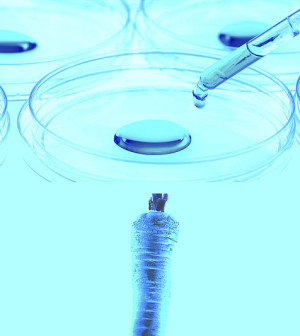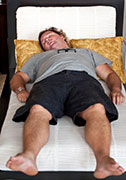- Could Your Grocery Store Meat Be Causing Recurring UTIs?
- Are You Making This Expensive Thermostat Error This Winter?
- Recognizing the Signs of Hypothyroidism
- 10 Strategies to Overcome Insomnia
- Could Artificial Sweeteners Be Aging the Brain Faster?
- Techniques for Soothing Your Nervous System
- Does the Water in Your House Smell Funny? Here’s Why
- Can a Daily Dose of Apple Cider Vinegar Actually Aid Weight Loss?
- 6 Health Beverages That Can Actually Spike Your Blood Sugar
- Treatment Options for Social Anxiety Disorder
How Well You Sleep May Depend on Your Genes, Study Suggests


How much sleep you get each night may depend to some extent on your genes, a new study suggests.
“Sleep patterns are influenced by genetic differences,” said study co-author Dr. Daniel Gottlieb, a sleep researcher and associate professor of medicine at Harvard Medical School. “This study is one of the first to begin identifying these genetic differences, and will hopefully help us better understand the causes of sleep disorders and their relation to other important diseases.”
The findings suggest that certain genetic variations make a difference of a few minutes’ sleep a night. But the research may ultimately point to a wider picture of how certain genes affect conditions such as attention-deficit hyperactivity disorder and diabetes, said Gottlieb.
Scientists believe several aspects of sleep — including when and how long people sleep — are inherited to some extent, Gottlieb said. Sleep duration, meanwhile, is connected to conditions such as diabetes, high blood pressure and depression, he said.
It’s possible that a gene variation causes sleep problems, which then cause, say, high blood pressure, Gottlieb said. But it’s also possible that the gene itself directly affects both, since “most genes serve multiple functions,” he added.
In the new study, researchers examined the genes and sleep habits of 47,180 people of European descent and those of 4,771 African-Americans. They identified two genetic variations tied to sleep duration, one of which was linked to about three minutes of extra sleep per night.
Then they reviewed previous studies for information about those genetic variations.
Simply put, “we identified an area of DNA that appears to influence how long an individual sleeps,” Gottlieb said. Those with one of the gene variations not only slept slightly longer but also had lower levels of attention-deficit hyperactivity disorder and lower blood sugar levels, the study found.
The other DNA area identified — this one linked to shorter sleep — previously has been associated with psychiatric problems, including risk for depression and schizophrenia, the researchers said.
Jim Horne, of the Sleep Research Center at Loughborough University in England, cautioned against making too much out of the study’s findings. “The effect of these genes on sleep is tiny, accounting for no more than a few minutes of a total night’s sleep,” he said.
“There are numerous mechanisms, maybe hundreds, in the brain affecting our sleep one way or another, all of which will be coded by one or more genes. Those looked at here are just a very few,” Horne said.
Also, the study only looked at a rough measure of time spent sleeping, not whether it was high-quality sleep, Horne added. In addition, he said, there are far more powerful nongenetic influences on our sleep.
Still, Horne said the study findings are interesting and come from reputable scientists.
For now, the research won’t have any immediate impact on the prevention, diagnosis or treatment of sleep disorders, Gottlieb said. But “a long-term goal of this research is improved understanding of sleep disorders, including early identification of those at risk for sleep disorders in order to prevent their occurrence,” he said.
The study appeared Dec. 2 in the journal Molecular Psychiatry.
More information
The Tech Museum of Innovation has more information on sleep and genetics.
Source: HealthDay
Copyright © 2026 HealthDay. All rights reserved.










